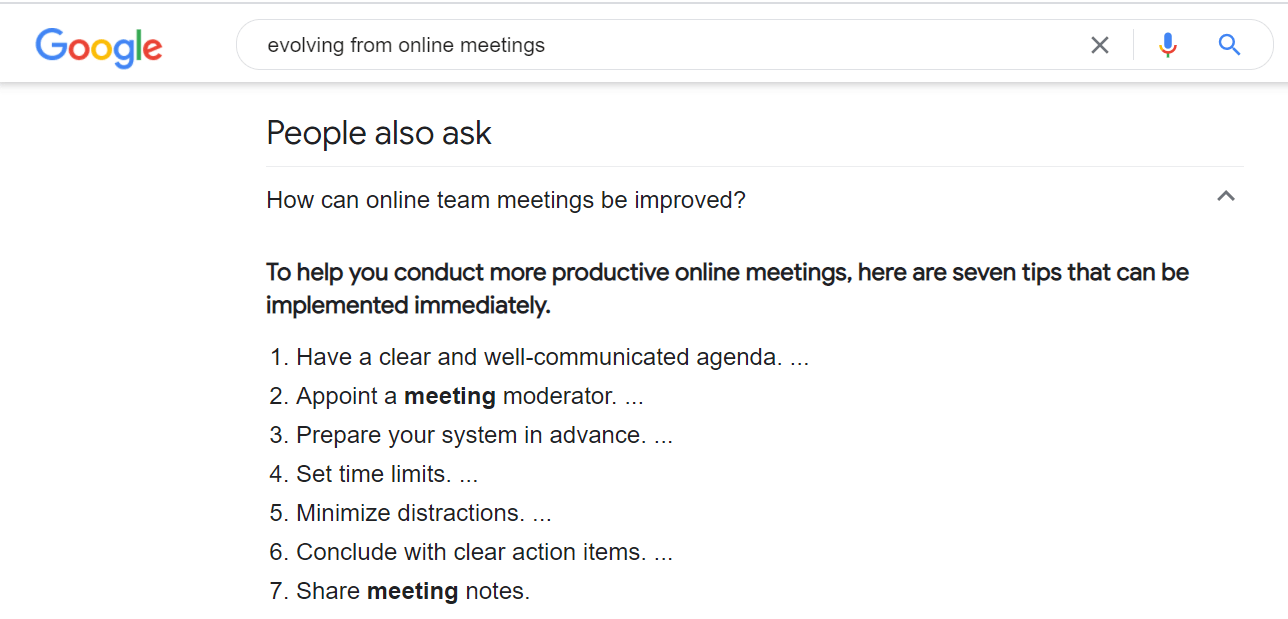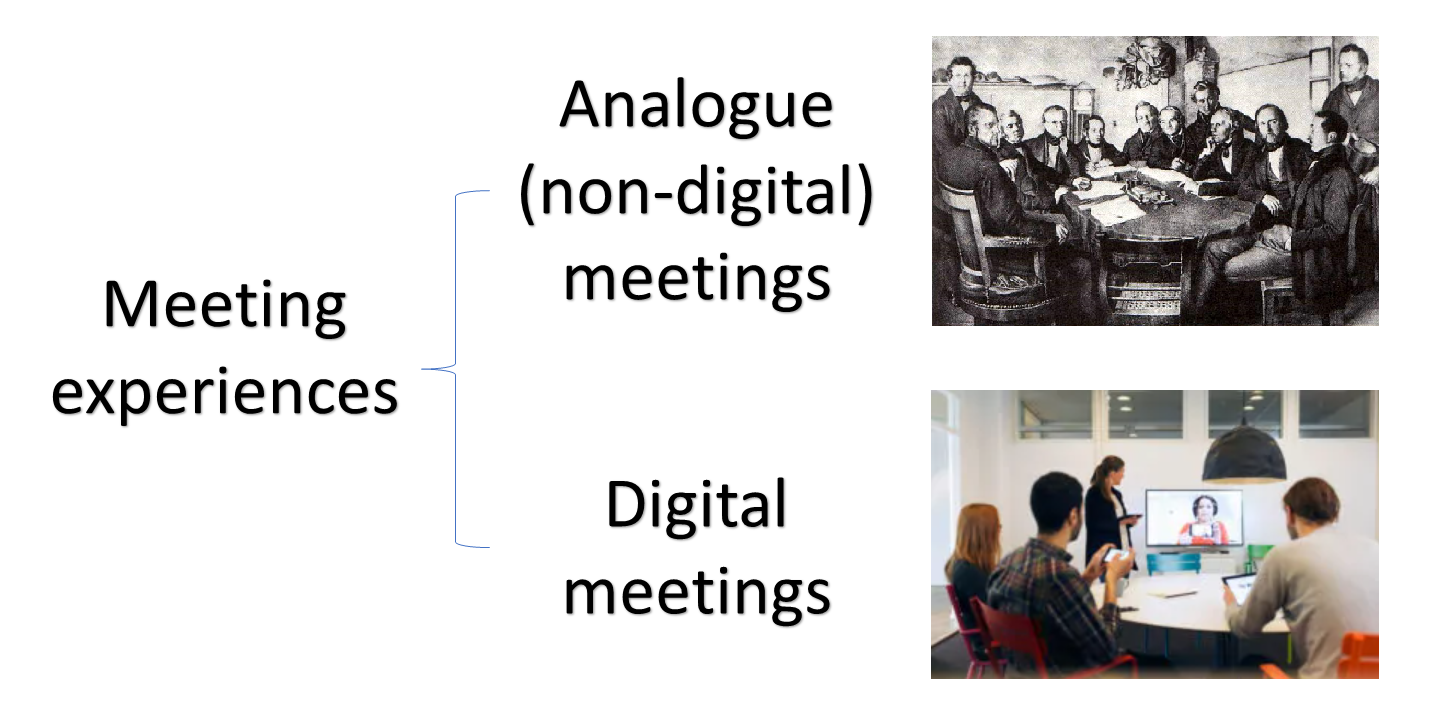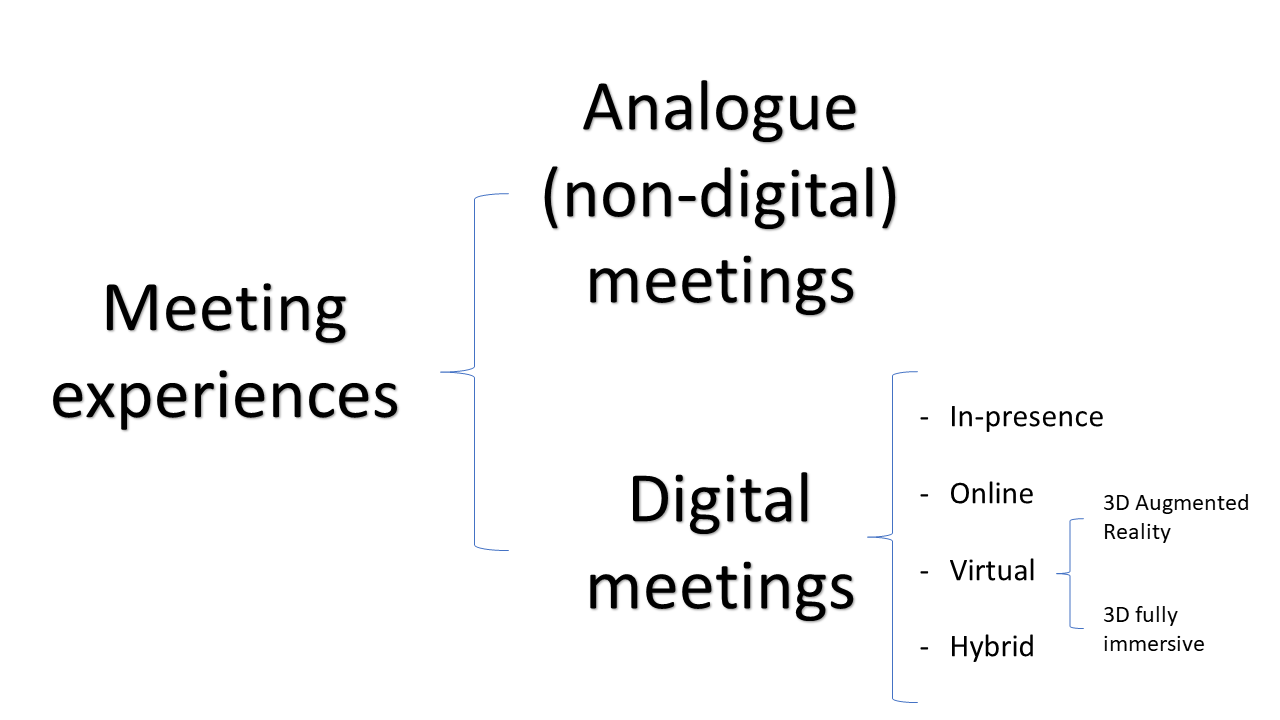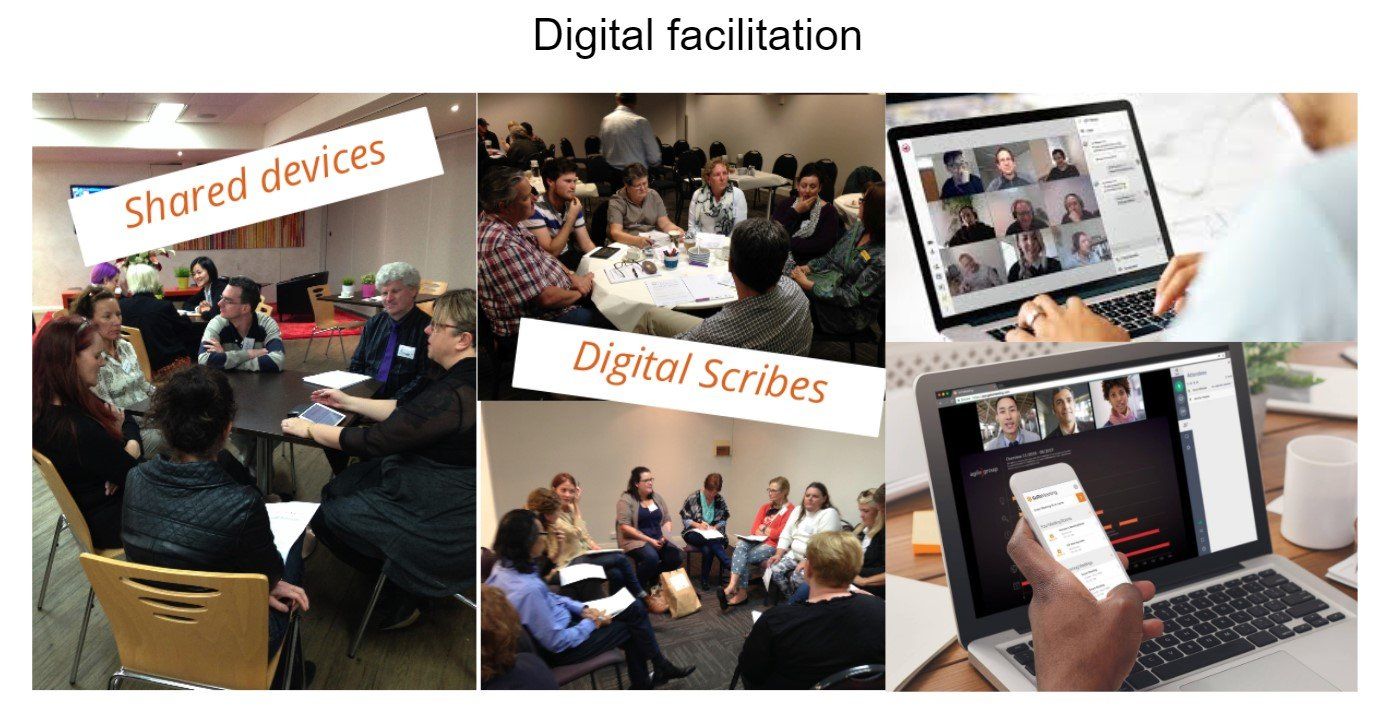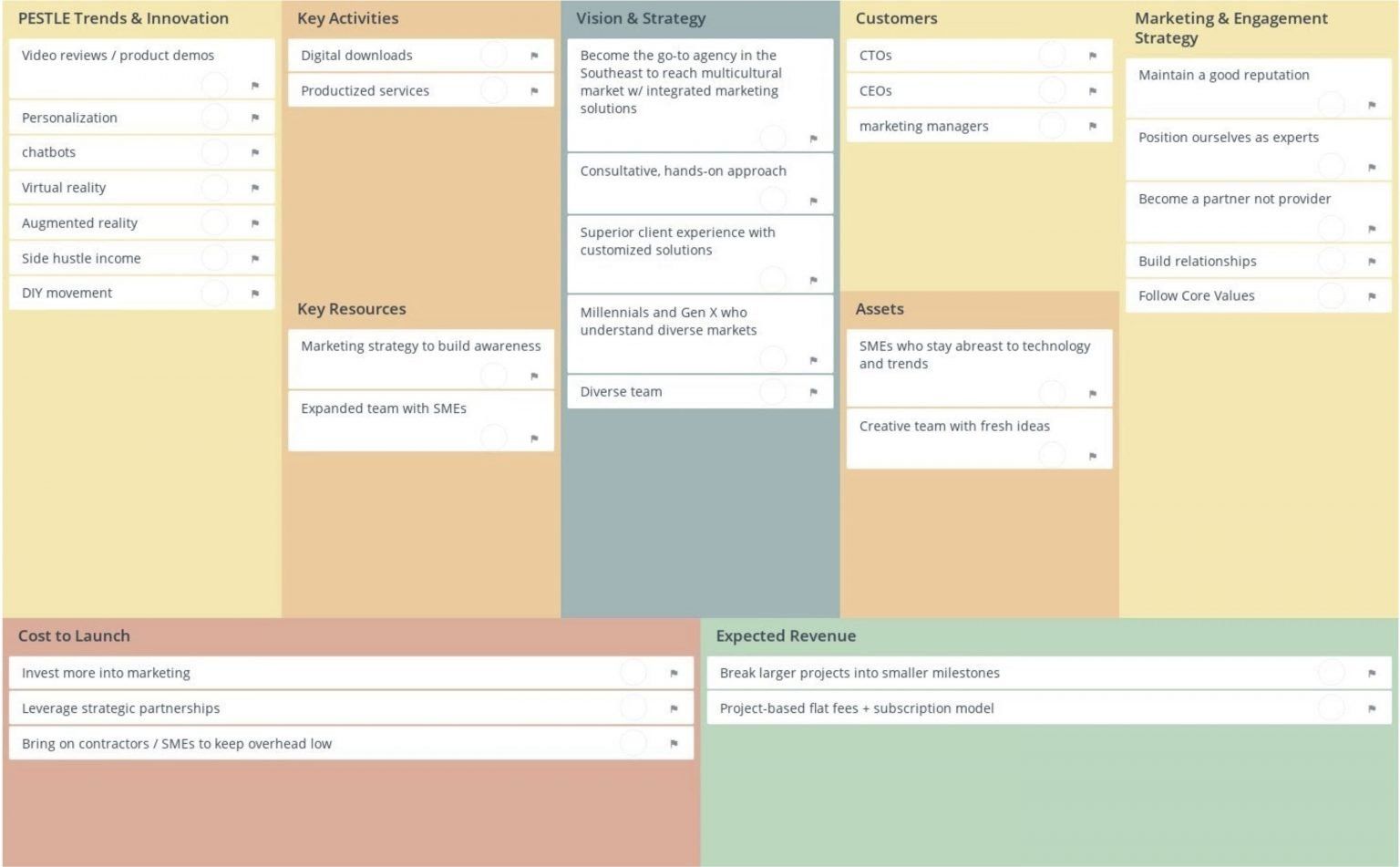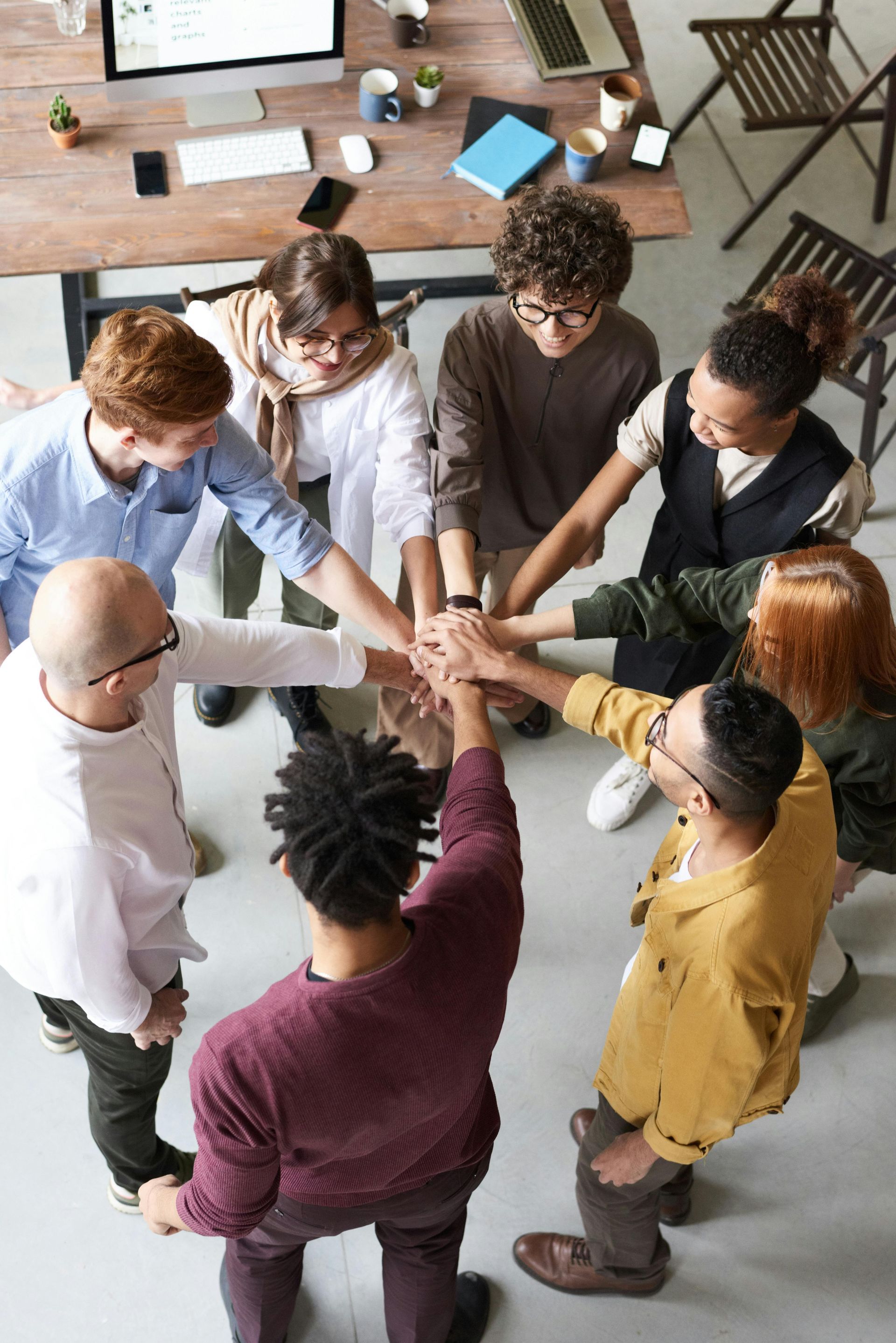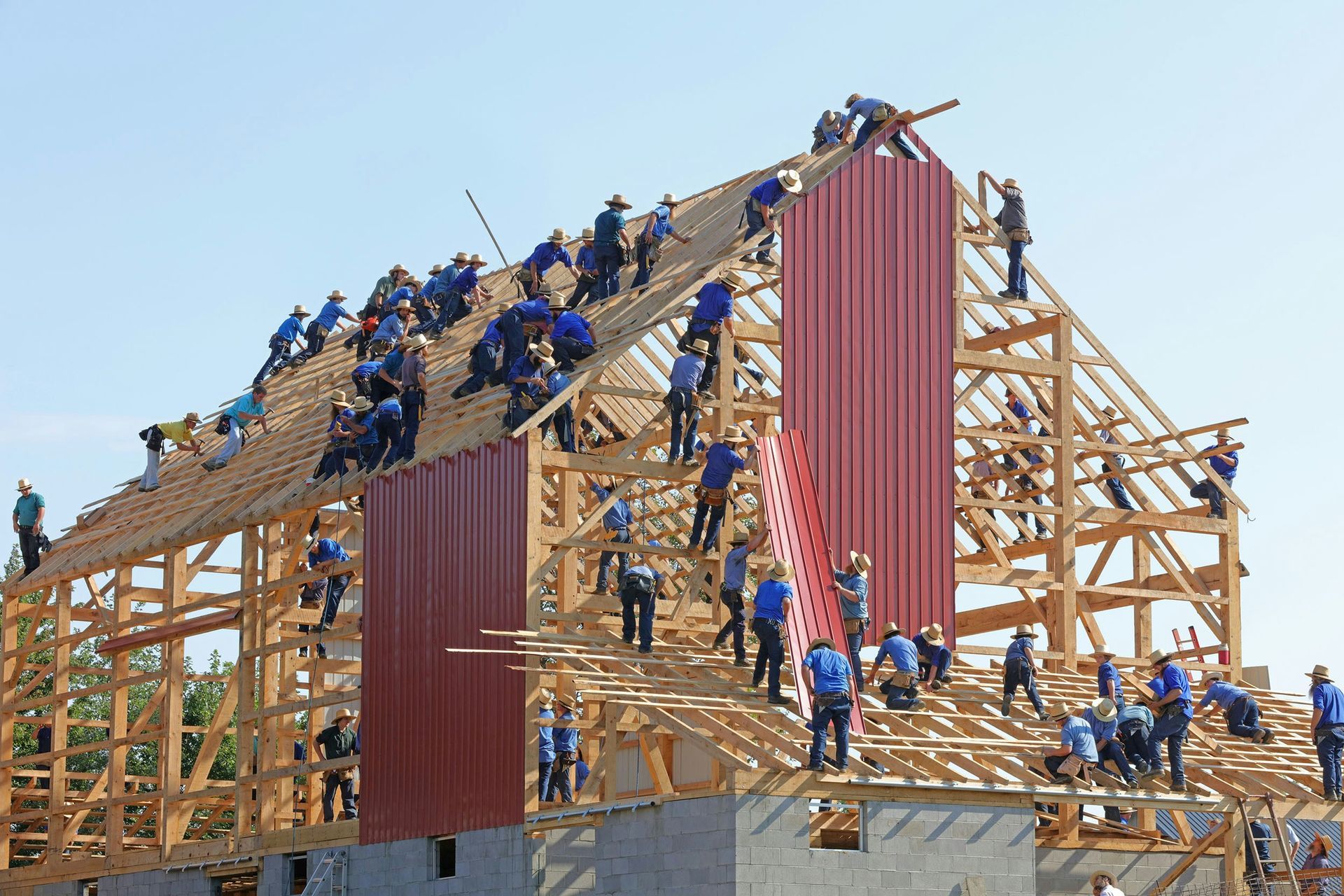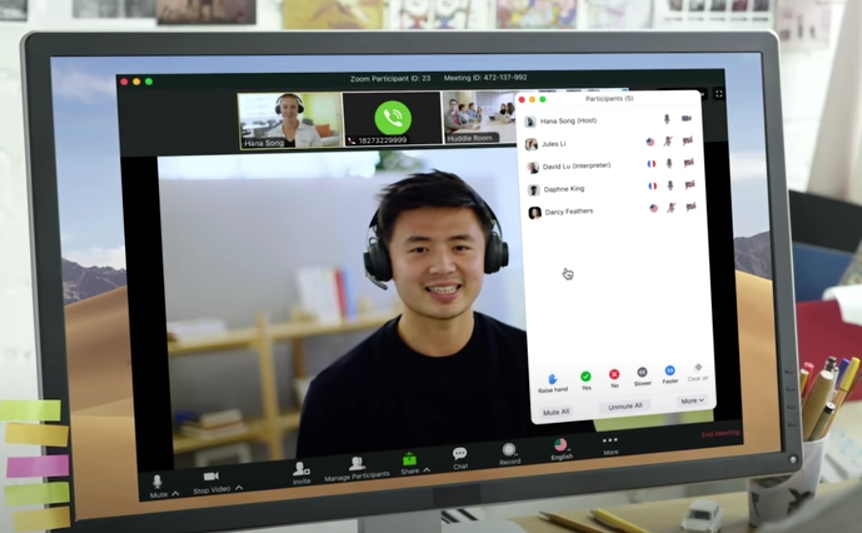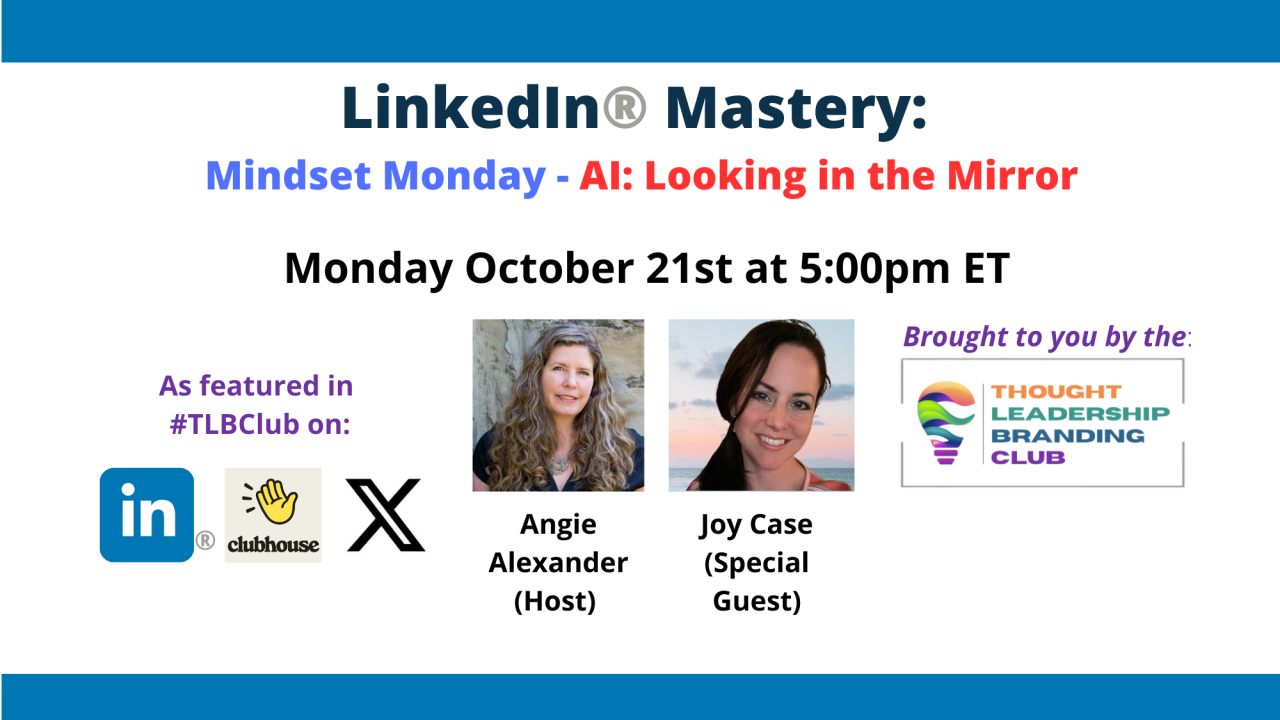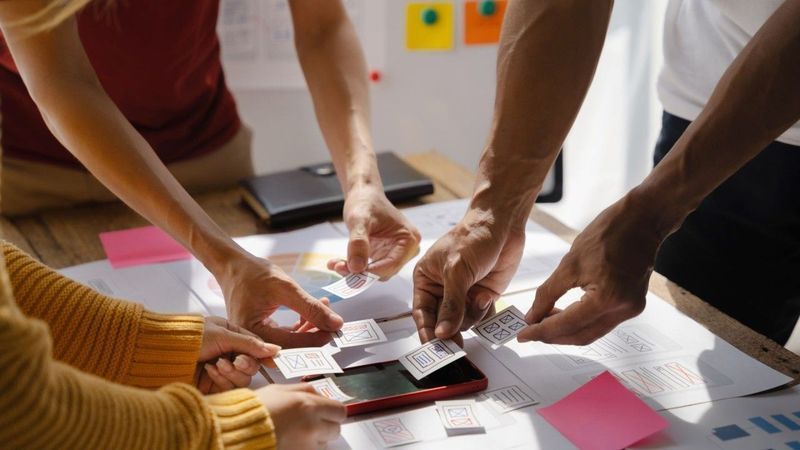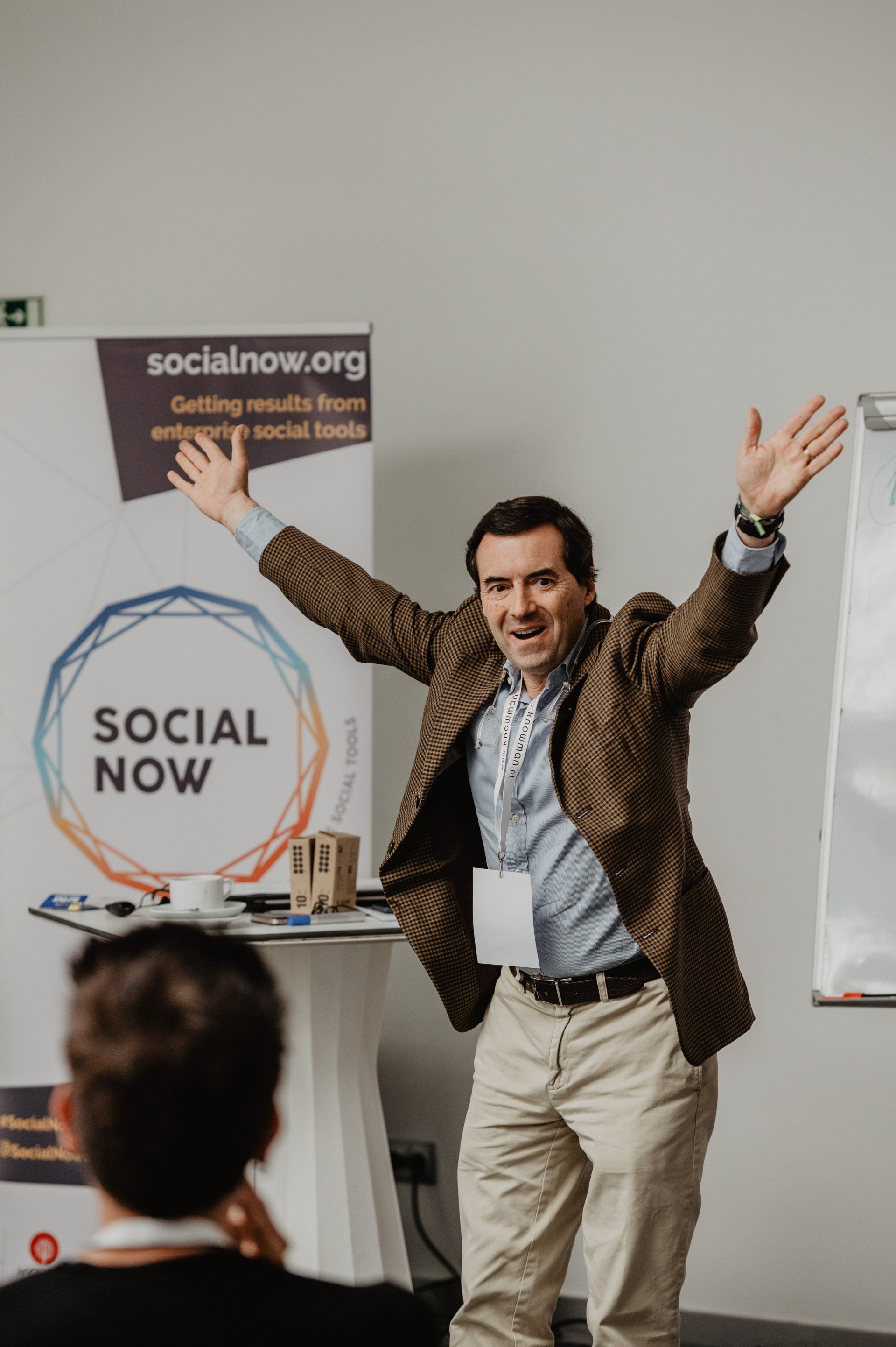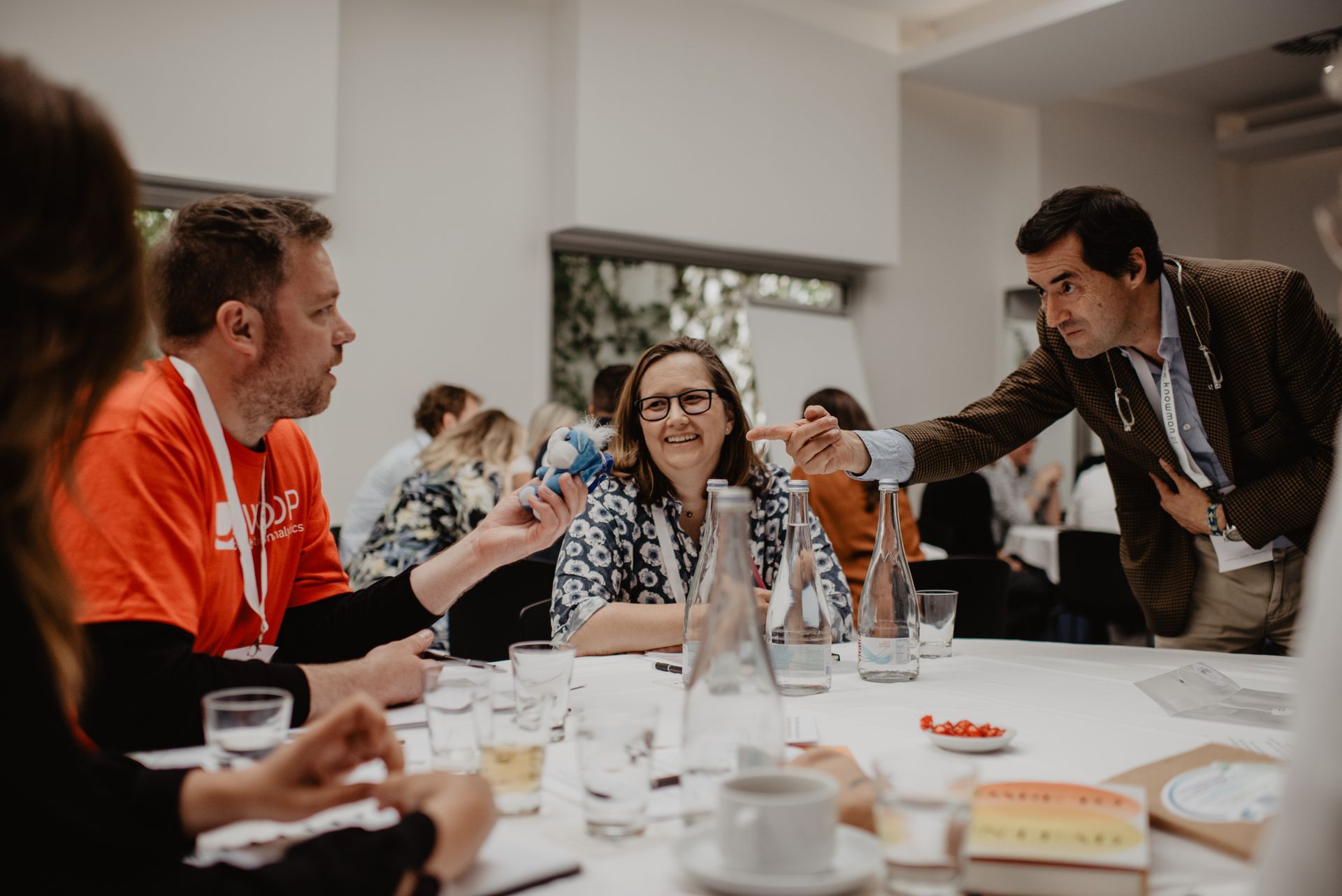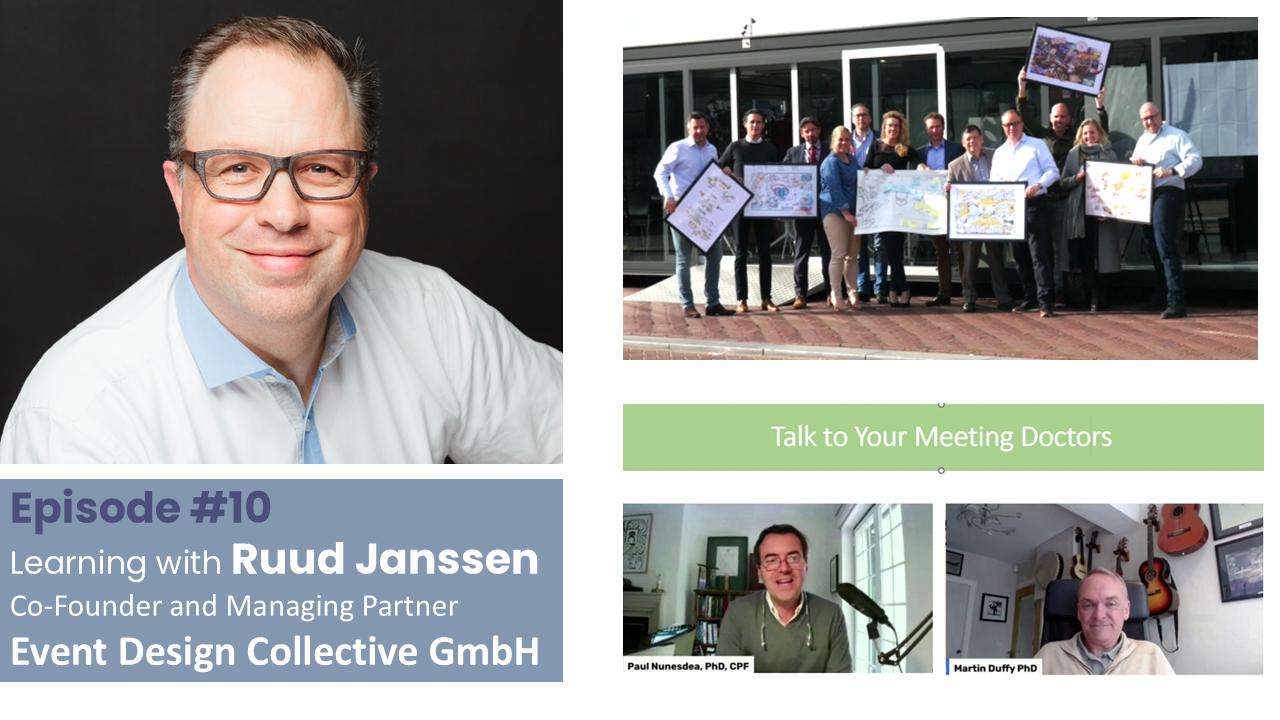
Evolving from online meetings
Understanding the challenges of a new era for digital collaboration

If one image is worth a thousand words then the above summarises the whole of this article. Let me flip the story and start by offering you the conclusions:
- Regardless of hosting in-presence or remote meetings, you need to effectively apply the right tools to avoid meeting disasters and achieve the desired outcomes.
- If you are hosting a digital meeting, you must learn how to apply the relevant tools designed to provide you with more satisfying meetings.
A new taxonomy
The impact of the pandemics on the way our species socially interacts is of historical proportions. You can evidence this by the sheer amount of information that has been published on the subject of 'a new virtual workplace', the adoption of 'remote working' and the massive generalization of online meetings.
When starting this article with the title in mind I typed 'evolving from online meetings' and here is what I got:
I was so surprised to read this because there is nothing in these thoughtful recommendations that couldn't be also applied to any kind of meeting, not just online.
So, I figured that it's about time to propose a new taxonomy that organizes the variety of designations around online meetings, virtual meetings or hybrid meetings (a combination of online and in-presence).
Why don't we simply differentiate between analogue (or non-digital) and digital meeting experiences?
Of course, this simplistic taxonomy can be further detailed as follows:
By adopting this new taxonomy we simplify a lot of the buzz around all the new forms of human interaction made possible by the adoption of digital technologies.
We may as well say that the digital revolution finally arrived at the MICE sector - Meetings, Incentive Travel, Conventions & Exhibitions - that has recently been rechristened as the Meeting Industry.
Meeting professionals are digital-ready
Back in 2020 when virtually millions of in-person meeting events were cancelled all around the world, meeting organizers scrambled to find alternative ways to have the same outcomes (or even better) from an online meeting experience.
This was possible thanks to the almost universal availability of video-conference platforms such as Zoom, Webex or Microsoft Teams, which always existed ou there but were forced into full adoption. The digital revolution in the Meeting Industry was totally driven out of necessity, not by the need of improving meeting quality.
In the pre-pandemic era, the ones that we're concerned with improving the quality of their meetings in the past, the main option was to hire master of ceremonies, moderators, and professional facilitators that improved the quality of human interactions in face-to-face in-presence gatherings. These meeting druids possess the know-how of powerful social interaction methods combined with adult learning techniques (Ref #2) such as serious games, role-playing simulations, and many other so-called' liberating structures' that provide fun and engagement to any in-presence meetings.
During the lockdowns, this industry almost came to a stand-still and I vividly remember reading a post from colleagues such as Holger Nauheimer the founder of Berlin Change Days saying that we all going to be bankrupt and need to change professions.
Fortunately for me and a few other users of digital tools since mid '90s, it was the start of a new era we longed for: Virtual is going to be the new normal was written in response with great accolades from dear colleagues but LinkedIn froze it somehow.
Yet, with COVID19 the opportunity was created for another class of digital technology beyond video-conference that have been developed since the turn of the century and provided a life-saving opportunity to millions of meeting moderators and facilitators that converted to provide their valuable services digitally all over the world.
Since March last year, when I was at the Global Board of the International Association of Facilitators I am proud to have activated a global initiative on Making Virtual Meetings a Sucess and in June last year in co-authorship with other renowned experts and digital facilitators, we published the book Beyond Virtual Meetings: Digital tools for higher performing teams and organizations in co-autorship with Martin Duffy and other renowned meeting scientists and digital facilitators.
Today, we may say with certainty that the state of readiness from Meeting Professionals worldwide to host digital meeting experiences is now close to maximum (Ref #3).
So, if you as a meeting organizer are still unsure about your next online or hybrid meeting's outcomes just follow Dr Google advice above or the ones I am going to share below.
Evolving online meetings
I started this article with the conclusions and if you're still reading this so far, let me briefly expand them here to consolidate some shared learning not only from my practice but also from other renowned practitioners in this field.
If we adopt my proposed taxonomy for meeting experiences we have to differentiate between two approaches to meeting design.
- Thinking about a meeting event as the product.
- Thinking about meeting events as a part of an ongoing process of collaboration.
In a previous article (Ref #4) I have touched on this important differentiation as the professional practices and sources of knowledge from these two different perspectives offer different types of advice.
If you are thinking of designing an event for a customer as a stand-alone 'piece of art', then colleagues from former MICE current Meeting Industry are the go-to resource, Associations such as MPI - Meeting Professionals International.
Yet, if you are looking at meetings as a means toward a wider goal, typically related to organizational development, product design or change management, then the go-to resource is the IAF - International Association of Facilitators where you can search for Certified Professionals here.
Within this second pesperctive, one of the earliest articles that I have seen was published by Ron Henderson (Ref #5) with the essential components of an ethical virtual meeting. Rob proposes a checklist, explains a few concepts, recommends some useful technologies.
Of course, the major technology providers themselves offer important and useful advice for hosting effective online meetings, such as the case of 6 Ways to Facilitate Meaningful Online Meetings published by Mural (Ref #6) and I can also recommend by book co-authors' blogs Elise Keith, Jeremy Lu or Ilkka Mäkilalo.
An interesting article worth mentioning here was published by Hector Villareal's
On Virtual Meetings, Jazz and COVID19.
The hybrid bottleneck
Whenever you think about meetings as a product and whenever you are designing a hybrid meeting experience with participants attending both online and in presence you will likely be facing the biggest challenge nowadays as business, not-for-profits and governmental organizations are eager to have their customers and staff members assembled in-presence yet engaging as many as remote participants as possible at the same time.
Two distinguished colleagues have recently published important advice on this matter.
Judy Rees from RessMcCann with Tips for improving your hybrid meetings and Nancy Settle Murphy proposes a new term "Asymmetrical Meetings" which more accurately describes the imbalance between remote and in-person participants (Ref #7).
Nancy posted recently on LinkedIn this gem:
"With people returning to the office, the ground is about to shift again, and it’s in all of our best interests to maintain symmetry any way we can. Here are a few tips we've practised successfully over the years:
- Avoid (hybrid meetings) if you can. Ask yourself whether it’s really necessary for people who work in the office to gather in one room for the meeting, while others join from afar.
- Design for distance as a default. Rather than asking yourself how you’ll integrate the remote participants into the conversation, flip your thinking by designing the meeting with remote participants in mind, and then figure out how best to integrate those in the room.
- Assign an empathetic individual who can act as an advocate, or a guardian, for all remote participants. This person will make sure that the conversation is balanced among people in all locations.
- Create a bridge. For every location where there are at least a few people coming together in one place, ask someone to act as the “bridge” between those people and the whole group.
- Make sure everyone in the room is visible to remote participants, and vice-versa.
- Break out breakouts by location. If you plan to use breakout groups, consider having remote participants form their own breakouts, while those in the room form other breakouts".
My 2 cents
To close the circle on the second conclusion of this article the challenge remains for you as a meeting host to locate and connect with the right professionals to evolve your meetings.
However, if you are a meeting professional then you need to invest in the learning of new digital tools that were designed to improve human interactions that naturally occur in both in-presence and remotely.
This means that the digital revolution has arrived (finally) to your profession and besides the wealth of analogue tools you already master (lego play, post-it notes on the wall) you also need to take advantage of the latest technology to design more engaging meeting experiences.
A digital meeting experience can be designed regardless of a face-to-face in-presence or remote meeting. What I have discovered from previous experience is that digital tools for collaboration help to reduce the hybrid meeting bottlenecks whenever you design a process that sustains collaboration, not just to think on the meeting as an end-product but as a part of an ongoing process of collaboration that you co-create with your customers.
About the author
Paul Nunesdea is the English pen name of Paulo Nunes de Abreu, Facilitator, Master of Ceremonies, Author, and Publisher of the book series - Architecting Collaboration, his LinkedIn profile can be reached here, or in Spanish here, or Portuguese here.
Paul is an IAF Certified Facilitator™ who designs and hosts events for clients ranging from large companies to municipalities and regional governments.
His academic background as a PhD researcher combined with +15 years of experience as a former CEO and entrepreneur has sharpened a client-serving mentality eager to co-create win-win solutions. As an NGO founder, he co-founded Digital Health Portugal and hosts the Health Regions Summit, the Health Data Forum, and several other initiatives.
As both a GroupMap™ and Howspace™ certified facilitator he co-founded the Digital Collaboration Academy with renowned facilitator Peter Seah united by the vision of creating and sustaining a new emerging field -
Digital Facilitation - augmented by the core competencies of the IAF - International Association of Facilitators.
References
Ref #1 https://www.business.com/articles/7-powerful-tips-for-highly-productive-online-meetings/
Ref #2 https://www.qualityassurancemag.com/article/9-adult-learning-tips-and-techniques/
Ref #3 https://www.advisorperspectives.com/articles/2020/12/21/how-online-meetings-will-evolve-in-2021
Ref #4 https://www.groupvision.com/how-important-is-the-design-of-your-event/
Ref #5 https://www.thresholdlimited.com/virtual-meetings
Ref #6 https://www.mural.co/blog/why-online
Ref #9 Join our LinkedIn Group: https://www.linkedin.com/groups/8587277/

Follow Us
"Be brave enough to start conversations that matter and shift the direction of change for the better."
col.lab | collaboration laboratory is a spin-off from the book series " Architecting Collaboration " and our privacy policy can be consulted here
My Meeting Support is an event services brand by col.lab | collaboration laboratory






